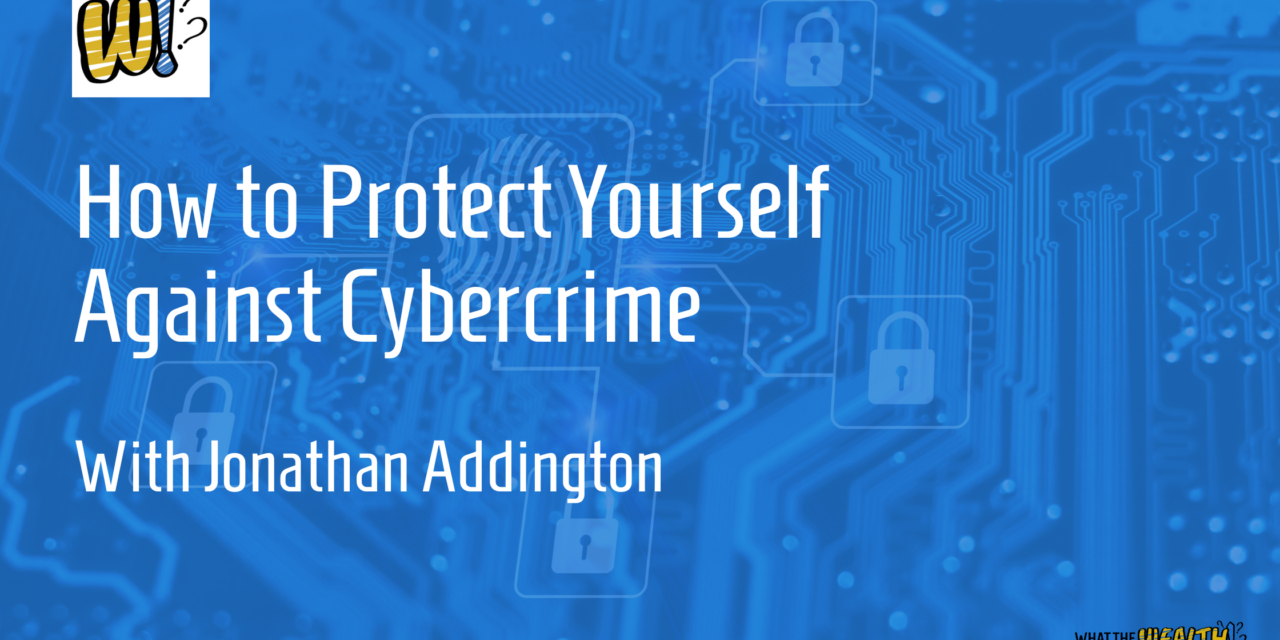Have you been a victim of cybercrime? If not, consider yourself lucky and know it’s probably only a matter of time until your luck runs out. Every year, 15 million people in the U.S. fall victim to identity theft, resulting in $50 billion in monetary losses with an average loss of $3,500 per victim.
Those are alarming numbers, but there are steps you can take to protect yourself. Today we’re speaking with Jonathan Addington of JM Addington Technology Solutions about cybersecurity.
The Dark Web
For many of us, especially those of us who are, to put it politely, technologically challenged, we’re just happy if our emails are downloading to our phones and the printer is working! But tech support and cybersecurity are two different things. And if you think a bum printer will ruin your day, just wait until someone from the Dark Web enters your life!
The Dark Web is a bit of a catch-all term but put simply; it’s where the bad guys communicate on networks that are difficult and sometimes impossible to trace. The Dark Web offers something akin to Amazon for criminals. They can browse and buy all kinds of things, including your bank account information, credit card numbers, name, date of birth, Social Security number, mother’s maiden name (Although she may offer that up for free on Facebook!), health insurance ID information, and passwords for pennies.
There is even customer support should these shoppers have a question! Cybercrime has standard operating procedures and a hierarchy just like the mob, and just like the mob, in some ways, it’s a business. A lucrative one, as we saw with the numbers in the opening paragraph.
Breaches
Not securing your online information is the equivalent of walking through a dangerous area at night with cash hanging out of your pockets and your credit card number written on your forehead! You’re easy pickings for the criminals out there.
We have all heard of the big security breaches, Equifax, Target, Home Depot. But you don’t hear about the breaches at small and medium-sized businesses. The non-chain grocery store you shop at, and the local bars and restaurants you frequent. And possibly the hospitals that you have had tests or care at.
But those smaller breaches happen too, every single day. And once the bad guys have your information, they exploit it. They can drain your checking account, open credit cards, take out a mortgage, and even run up thousands of medical costs. Once caught in the web of identity theft, it can take months, even years, to unravel.
This is not meant to scare you but to make you aware so you can take steps to protect yourself against cybercrime.
Lock Your Credit
Without question, locking your credit at all three of the major credit bureaus, Equifax, TransUnion, and Experian, is the most important and effective way to protect yourself from cybercrime.
The locks take about an hour to set up, and your credit can’t be checked once in place. That means no one can open a credit card, rent an apartment, take out a loan or a mortgage using your pilfered identity because all those things require a credit check.
If you want to do one of those things, you can request the lock to be lifted, and you’ll receive a PIN to do so. You can request the length of the lift, and it will be put back in place after that period.
Each individual needs a lock. You’re not fully protected if you have one, but your spouse doesn’t.
Don’t Stuff Your Checking Account
A checking account is designed for money to go into and out of frequently because, for most of us, it’s where we deposit checks and pay bills. On the other hand, a savings account is mainly designed for money to go into; money comes out far less frequently than a checking account.
Those designs make it easier for cybercriminals to steal money from your checking account and harder to steal it from your savings account. The same is true for your brokerage accounts, and getting money from them takes several days and requires a few steps, too, so criminals tend to leave those alone.
Don’t keep too much money in your checking account. If it’s stolen, you’ll probably get it back, or most of it back, but it can take a few days to a few weeks. In the meantime, you can quickly transfer money for your bills from your savings account.
Review Your Accounts
With the advent of online banking, checking your bank and credit accounts is faster and easier than ever; it takes seconds a day. Check those accounts frequently to look for any suspicious activity.
The faster you spot it, the faster the bank or credit card company can shut it down. And in some cases, if you don’t notify them within a specific timeframe, you can be held responsible for any losses or charges.
Install Updates
Whenever you get a notification to update a computer, phone, tablet, or any other device, update it. Those updates often patch security holes and are the best way to keep your device free of viruses. The longer you go without an update, the more vulnerable you are to cybercrime.
Use Multi-Factor Authentification
MFA has come a long way. You no longer have to wait several minutes for the text or email with the code; it’s almost instant. Using MFA can protect you from nearly all attempts at cybercrime.
Use a Password Manager
We all know we aren’t supposed to use the same password for more than one account. But we do it anyway because who can remember dozens of passwords?! No one, which is what a password manager is for.
Some popular managers include 1Password, Keeper, and Last Pass. These tools allow you to use totally random passwords, which offer more security than things like your pet’s name or your initials and date of birth! Because if you can remember a password, a computer can guess it! And there are browser extensions that allow the manager to auto-populate your passwords, so it’s easier than using one you remember and type yourself.
Protect More Than Your Money
In the grand scheme, you may not lose a lot of money if you’re the victim of a cybercrime or identity theft. The average victim loses $3,500. But straightening everything out can take months, even years. And sometimes, just when you think things are sorted out, another problem stemming from the crime pops up and has to be handled. So the real theft is your time, our most precious commodity. Stealing your time means stealing time from working towards achieving your dreams. So take the simple steps above to protect your money, your time, and your dreams.
If you have questions about financial matters, schedule a meeting so we can help you Live the Life You Love.
Listen to the Full Episode:
What You’ll Learn In Today’s Episode:
- How to keep your information more secure.
- What cybercriminals have access to.
- What the dark web is.
- How to protect yourself from the “Amazon of the dark web.”
- The importance of locking your credit.
- Why you should always select “yes” to updates on your device.
- The benefit of selecting multi-factor on your devices.
Ideas Worth Sharing:
“The easiest thing you can do is lock your credit at all three of the major bureaus.” – Jonathan Addington
“I don’t think there is anything that you can do to protect yourself from identity theft more than locking your credit.” – Jonathan Addington
“When it comes to investing, it’s about balancing the risk with your goals.” – Jonathan Addington
Resources In Today’s Episode:
- Jonathan Addington: LinkedIn | Website
- Jonathan Bednar: Email | Twitter | LinkedIn
- What The Wealth?! by Jonathan Bednar
Enjoy the show? Use the Links Below to Subscribe:





